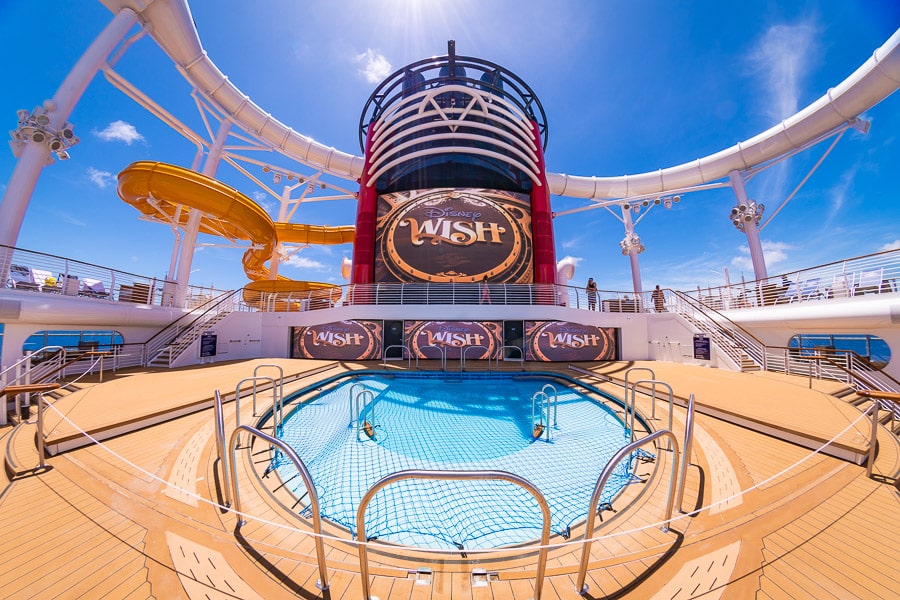
Disney Cruise Line has reduced its deposits for reservations, slashing in half the percentages of total fares that different types of guests are required to pay in advance. This is part of an effort to reduce upfront costs and reduce the initial sticker shock of booking a DCL sailing. We share full policy change details, plus our commentary about the motivations and consequences of this change.
The primary motivation for reducing deposits is simply to increase reservations. This is like a twist on some of what we covered in Rising Tide of Disney Cruise Line Discounts late last year, as DCL tried to secure more reservations. One such way, as intimated in the title of that post, was via special offers. Another is policy changes.
The underlying reasons are essentially the same: DCL vacation prices have skyrocketed over the last few years in the wake of pent-up demand for cruising. Rates exploded and there was a lack of deals as revenge travel ran hot. Just like what happened with Walt Disney World during the height of revenge travel. Also as with WDW, the higher prices were unsustainable, and Disney Cruise Line has been ‘recalibrating’ throughout 2025 in an attempt to entice cruisers to return.
As discussed elsewhere, pent-up demand didn’t play out along the same timeline for all types of travel (Florida “reopened” and welcomed visitors over a year before cruising resumed in earnest), so it makes sense that Disney Cruise Line would follow the same trajectory as Walt Disney World when it comes to special offers, just delayed by a couple of years. We went from discussing a ‘dearth of deals’ in 2022 to a deluge of them last year and return to the 2019 playbook this year. Walt Disney World is now on the backside of pent-up demand, and pulling levers to entice visitors to return.
It seems like a similar story with Disney Cruise Line for 2025. Another factor, presumably, is the new ships that are coming or have come online. Quite simply, Disney Cruise Line has more capacity now than it did in 2019. That’s already the case with the Wish and Treasure, and will be more so heading into 2026 with the Destiny and Adventure (the latter is probably less relevant since it serves a new market).
As a result of this, there’s a certain extent to which DCL can no longer target the same upmarket audience–there are only so many potential consumers at the income tiers that Disney Cruise Line was previously targeting. As its capacity expands within the U.S. market, so too does its need to cast a bigger net, so to speak.
Anyway, here’s a rundown of the 2025 Disney Cruise Line policy changes to its required deposits for booking a vacation…


New Disney Cruise Line Deposit Policy
Disney Cruise Line has reduced the required reservations deposit from 20% to 10% of the voyage fare for new bookings. For existing reservations made previously, the original 20% deposit remains in place in accordance with the terms agreed upon at the time of booking. Specific details for this update include:
Cancellation Fees
- Cancellation fees will follow the new deposit policy for sailings made starting June 18, 2025.
- If a reservation is cancelled during the deposit cancellation fee period and the deposit was 10%, the cancellation fees will also be 10% of the voyage fare.
- Cancellation fees for guests who previously paid a 20% deposit will be 20% of the voyage fare.
- Per existing policy, deposits will continue to be non-refundable for Concierge Guests.
Modifications
- If a Guest is outside the cancellation fee period and prefers to take advantage of the new 10% deposit policy, they may cancel and rebook their reservation under the updated terms.
- Standard cancellation fees may apply for reservations within the cancellation fee period, as outlined in Disney Cruise Line’s terms and conditions.


Onboard Placeholder Offers
- Guests who have booked a Placeholder Reservation will also see a change in the required deposit when they add a sail date to their reservation if the sailing is 7 nights or longer.
- Guests will only be required to pay a 5% deposit. If the reservation is cancelled in the deposit cancellation fee window, Guests will only be subject to a 5% cancellation fee.
- In addition to the deposit percentage change, there will no longer be a three day hold when converting Onboard Placeholder Offers through the Contact Center or when booking online. A deposit will now be due at the time of placeholder conversion now that placeholders can be converted online.
As always, we recommend working with an Authorized Disney Vacation Planner. Be Our Guest Vacations is our preferred travel agency, and they have many agents with extensive cruise experience and expertise.
Using a travel agency is incredibly advantageous when it comes to cruising–most will provide on-board credits based upon the size of the booking, along with itinerary advice and suggestions for the cruise. They’ll also deal with Disney on your behalf and, speaking from experience, this can be invaluable when something goes wrong. Especially if, like me, you hate talking on the telephone.


Our Commentary
Disney Cruise Line is reducing up-front deposits to lower the barrier to entry on making a reservation. That much is fairly self-evident. As cruise costs have exploded in recent years, deposits have increased along with them. I’m no math whizz, but it’s my understanding that this is how percentages work. Beyond the obvious, there are a few theories that could explain why Disney Cruise Line is reducing this barrier and what consequences this could have.
The first is that they’ve determined it’s a simplest way to ease consumers into higher prices. Charge the exact same amount, but with less upfront, and more over time. I’ve read countless news reports about the rise of ‘buy now, pay later’ and how this is especially popular with younger Americans. While there are very obvious differences between that and this, the underlying motivations and consumer psychology is at least similar.
Another possibility is that Disney Cruise Line believes they can actually push prices higher with the lower upfront fee. Maybe not by a significant amount, but by enough to squeeze out some quarterly growth. Walt Disney World has made moves like this over the years, and it’s possible that’s what is happening here. I highly doubt this, though.


What’s more likely is that Disney Cruise Line is seeing demand drying up and consumers balk at higher prices. I’m not going to rehash the above commentary about revenge travel burning out, but DCL is undoubtedly starting to see this in forward bookings. This still hasn’t shown up during quarterly earnings calls, but a lot can be masked by the introduction of new ships.
At the risk of stating the obvious, the year-over-year numbers are going to continue going up as long as Disney Cruise Line has new ships coming online and keeps opening up new reservations. Frankly, it would be cause for serious concern if DCL saw a downturn in raw numbers at any point between now and ~2030.
It’s kind of like Comcast and Epic Universe–there’s obviously going to be segment growth, when you add a new theme park or cruise ship that did not exist in the prior year. But is it performing at or below internal expectations? What about per capita spending, capacity or occupancy numbers–how are those trending?


This could also lead to increased cancellations or a higher abandonment rate. Reducing the barrier to entry also has the effect of making Disney Cruise Line reservations more enticing or approachable to guests who may not end up being able to afford the trip. It’s safe to assume that DCL didn’t arrive at its previous deposit policies arbitrarily.
If there was no reason for such a high amount, they would’ve simply had a “no money down” deposit policy to capture as many bookings on the front-end as possible. The downside of such an approach, or a lower-dollar deposit amount on a high-dollar vacation, is that it inevitably results in bookings that are less serious and have a higher propensity to cancel.


We don’t want to overlook the obvious upside here, which is that lower upfront deposits makes Disney Cruise Line more accessible for more middle class families. Even if the total cost is unchanged, it’s fairly undeniable that the 20% down was a big hurdle for many families, including those squarely within the DCL demographic.
Many families don’t simply have a spare $500 to $2,000 lying around, which was often the amount required for a deposit under the previous policies. As we’ve advocated for the removal of friction elsewhere in the Disney Parks booking process, we’re also on-board with this as a guest-friendly change. As Americans find themselves squeezed from seemingly all directions, this is a little change that could make a big difference for some Disney Cruise Line guests!


Selfishly, I view this as a good thing beyond simply lowering the barrier to entry for vacations. My hope and expectation is that Disney Cruise Line introducing more uncertainty to its internal booking forecast increases the likelihood of last-minute deals resulting from a corresponding increase in last minute cancellations.
It remains to be seen how much less predictable their projections will become, but this will undoubtedly happen to some extent and with some sailings. The lower deposit does help juice the numbers on future earnings calls, though!
Planning to set sail aboard one of the DCL ships? Read our comprehensive Disney Cruise Line Guide to prepare for your voyage, plus plan entertainment, activities & excursions, and learn what to expect from your Disney cruise! For personalized planning & recommendations, click here to get a cruise quote from a no-fee Authorized Disney Vacation Planner. They can find you all of the current discounts, and help you plan the details of your cruise!
Your Thoughts
Thoughts on these Disney Cruise Line deposit decreases? Think this is a good or bad move? A sign that DCL has gotten ahead of itself with price increases during the pent-up demand era, and has lost some of its core clientele with current rates? Could this result in more last-minute deals due to cancellations? Agree or disagree with our assessment? Hearing from you is fun and helpful, so if you have questions or thoughts, please share them below and we’ll try to respond!










